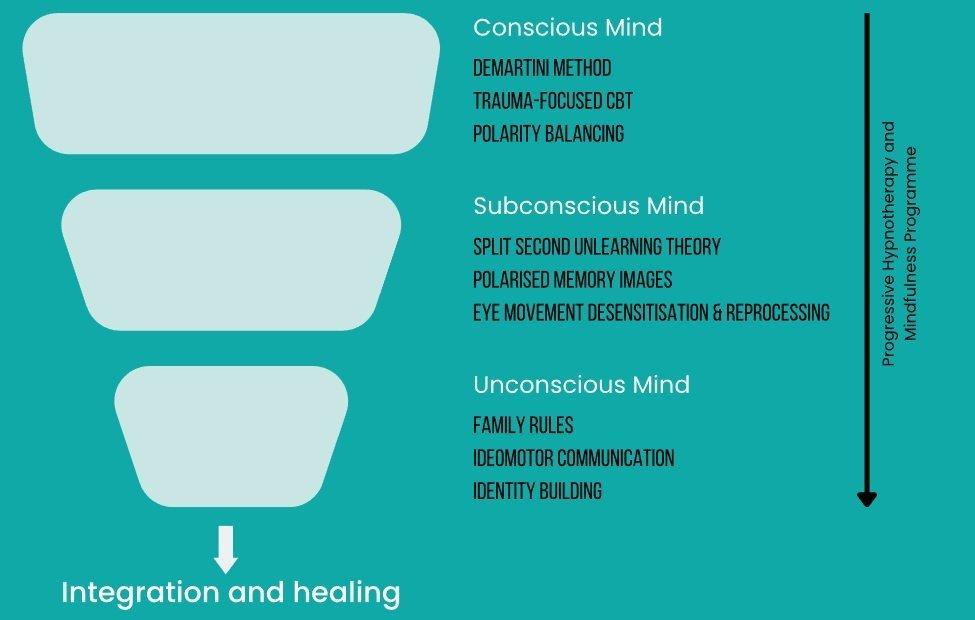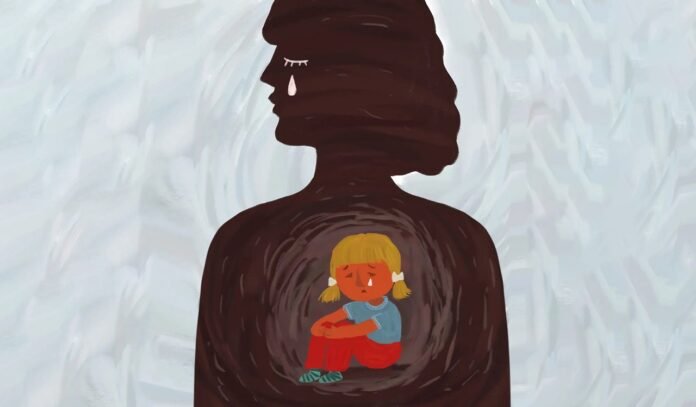Imagine your past experiences are pieces of a puzzle that shape the lens through which you view the world.
Childhood trauma, like a shadow lingering behind you, can silently influence the way you navigate adult relationships. From the intricacies of trust to the nuances of communication, its impact can be profound.
Understanding how these early wounds manifest in your present connections holds the key to unraveling complex dynamics and fostering healthier bonds.
What Is Childhood Trauma?
Childhood trauma refers to any distressing or disturbing experiences that occur during a person’s formative years and can have lasting effects on their mental and emotional well-being. These experiences can range from neglect and abuse to witnessing violence or experiencing a significant loss. The healing process from childhood trauma involves acknowledging the past, seeking therapy, and actively working through the associated emotions. Coping mechanisms such as mindfulness, journaling, or artistic expression can also aid in the recovery journey.
The long-term effects of childhood trauma may affect adult relationships and can manifest in various ways, impacting self-esteem, relationships, and overall mental health. Building a support system of understanding friends, family, or mental health professionals is vital in navigating the challenges that arise from childhood trauma. Resilience building becomes essential in overcoming the adversities faced during childhood, fostering inner strength and the ability to cope with triggers that may arise in adulthood. Remember, you aren’t defined by your past, and with time and effort, healing and growth are possible.

Impact Of Childhood Trauma On Adult Relationships
As you reflect on the impact of childhood trauma on adult relationships, consider how your attachment style might’ve been shaped by your past experiences.
Whether you find yourself exhibiting secure, anxious, dismissive-avoidant, or fearful-avoidant behaviors, these patterns can greatly influence how you interact with others in intimate relationships.
Understanding these attachment styles can provide valuable insights into your own behaviors and help navigate challenges in your adult relationships.
Attachment Styles
Understanding your attachment style can provide valuable insights into how childhood trauma may impact your adult relationships. Trust issues and intimacy struggles often stem from attachment wounds formed during early experiences.
Emotional regulation and relational patterns can be influenced by childhood triggers, leading to specific adult responses in relationships. Exploring your attachment style can be a pivotal step in your healing journey, helping you navigate relationship dynamics and fostering personal growth.
Secure
Exploring how childhood trauma influences your sense of security in adult relationships sheds light on the lasting impact early experiences can have on your ability to trust and connect with others.
The healing process from childhood trauma often involves building trust gradually, seeking emotional support, and learning to accept vulnerability. In secure relationships, there’s a mutual understanding of each other’s emotional needs, fostering an environment where vulnerability is accepted and supported.
Setting clear relationship boundaries becomes essential in creating a sense of safety and predictability. By recognizing the effects of childhood trauma on your sense of security, you can work towards developing healthier adult relationships through open communication, empathy, and a willingness to grow together.
Anxious or Anxious-preoccupied
Managing adult relationships can be particularly challenging for individuals with a history of childhood trauma, especially those who exhibit anxious or anxious-preoccupied attachment styles. People with anxious attachment tend to seek excessive reassurance, fear rejection, and may feel insecure in relationships due to past experiences. Childhood trauma can deeply impact one’s ability to trust and regulate emotions, leading to difficulties in forming secure connections.
These relational patterns often result in a constant need for validation and a fear of abandonment. Learning healthy emotional regulation techniques and seeking therapy can help individuals with anxious attachment styles navigate their relationships more effectively. Understanding the root causes of these behaviors is essential in fostering self-awareness and developing more secure attachments in adulthood.
Dismissive-avoidant
Individuals who’ve experienced childhood trauma may exhibit dismissive-avoidant attachment styles in adult relationships, impacting their ability to form secure connections and trust others. This pattern manifests through emotional distancing, where individuals may avoid deep emotional engagement as a coping mechanism against potential hurt.
The intimacy barriers created by dismissive-avoidant behavior can lead to challenges in establishing meaningful, close relationships. By prioritizing independence and self-reliance, these individuals may inadvertently push away partners. Vulnerability avoidance becomes a key aspect, making it difficult for them to open up and share their innermost feelings.
Recognizing these relationship patterns and understanding the roots of dismissive-avoidant tendencies can be essential steps in fostering healthier connections in adulthood.
Fearful-avoidant
Managing adult relationships can be particularly challenging for individuals who’ve experienced childhood trauma and developed a fearful-avoidant attachment style as a result. Relationship patterns for those with this attachment style often involve a constant push and pull between desiring closeness and fearing emotional intimacy.
The fear of getting hurt again can lead to vulnerability avoidance, making it difficult to open up and trust others. Attachment fears rooted in past trauma can resurface, causing individuals to struggle with forming secure connections. Trust issues may be pervasive, making it hard to believe in the sincerity of others’ intentions.
Understanding these dynamics and working on building a sense of security within relationships can be essential for those with a fearful-avoidant attachment style to foster healthier and more fulfilling connections.

Trust Challenges
Managing trust challenges in adult relationships can be a complex and delicate journey influenced by childhood trauma. The healing journey often involves building trust from the ground up, brick by brick, as emotional triggers from the past can spark vulnerability struggles and intimacy fears. It’s important to understand that your difficulties with trust are valid and rooted in your experiences growing up. These challenges may manifest as a constant fear of being hurt, an overwhelming need for control, or an inability to open up to your partner.
Handling trust issues requires patience and self-compassion. Start by acknowledging your past and how it affects your present relationships. Communicate openly with your partner about your struggles, allowing them to support you through this process. Therapy can also be a valuable tool in unpacking deep-seated trust issues and learning healthier ways to connect with others. Remember, healing takes time, but with dedication and understanding, you can gradually build a stronger foundation of trust in your relationships.
Communication Styles
Exploring the impact of childhood trauma on adult relationships can greatly shape your communication styles, influencing how you express your thoughts and feelings to your partner. Childhood trauma may affect your communication through various channels. Assertive listening, where you actively listen to your partner’s words and emotions, might be challenging if past experiences have made you wary of trusting others. Nonverbal cues, such as body language and tone of voice, may also carry added significance, as they could trigger memories or emotions tied to your trauma.
Conflict resolution might pose difficulties, especially if confrontation was a part of the trauma you experienced. Emotional regulation could be a struggle, leading to heightened reactions or emotional shutdown in tough conversations. Establishing healthy boundaries might be complex, as blurred lines from past experiences may make it harder to clearly define what’s acceptable in a relationship. Understanding these influences can help you navigate communication challenges and work towards building healthier interactions with your partner.
Trauma Reenactment
Exploring adult relationships after childhood trauma often involves unconsciously reenacting past traumatic experiences in a way that can influence your current interactions and behaviors. Trauma triggers from the past can unknowingly prompt you to recreate similar scenarios in your present relationships. This repetition may lead to relationship patterns that mirror the dynamics of your early traumatic experiences. These patterns can manifest in various ways, such as seeking out partners who exhibit similar traits to those who caused the initial trauma or reacting to situations in ways that echo past emotional responses.
Understanding how trauma reenactment impacts your relationships is a vital step in the healing process. By recognizing these patterns and emotional responses, you can begin to unravel the links between your past and present interactions. Developing healthy coping mechanisms to manage these triggers is essential for fostering positive and fulfilling relationships. Through introspection and seeking support, you can gradually break free from the cycle of trauma reenactment and cultivate healthier relationship dynamics.
Emotional Intelligence
Emotional intelligence plays a critical role in maneuvering the complexities of adult relationships, influencing how individuals perceive, express, and manage their emotions within interpersonal dynamics.
Self-awareness and empathy are foundational aspects of emotional intelligence, allowing you to understand your own feelings and those of others.
Developing social skills and self-regulation helps in starting conflicts and fostering healthier connections.
Emotional regulation and conflict resolution are essential tools in maintaining stable and fulfilling relationships, enabling effective communication and problem-solving.
Establishing clear relationship boundaries and embracing vulnerability are key components in building trust and intimacy.
Recognizing trauma triggers and setting out on a healing journey can lead to personal growth and the ability to form secure attachments.
Mental Health Conditions
Handling mental health conditions in adult relationships can present unique challenges that require understanding, support, and effective communication. Living with anxiety management or managing depression symptoms can impact how you interact with your partner. Here are some key points to take into account:
- Anxiety Management: Learning to recognize triggers and communicate your needs can help your partner understand and support you better.
- Depression Symptoms: Openly discussing how depression manifests for you can aid your partner in providing the necessary support and encouragement.
- Coping Mechanisms: Sharing healthy coping mechanisms with your partner can enhance mutual understanding and strengthen your bond.
- Therapy Benefits: Seeking therapy not only benefits your mental health but can also positively impact your relationship by providing tools to handle challenges together.
- Relationship Struggles: Acknowledging when mental health conditions affect your relationship dynamics is essential for effective problem-solving and growth as a couple.

Working On Trauma Resolution
You may find that therapy offers a safe space to explore and heal from your childhood trauma, paving the way for a healthier approach to adult relationships.
Engaging in inner work can help you understand how your past experiences influence your present interactions, offering a path towards emotional growth.
Therapy
In therapy, individuals work on resolving childhood trauma to improve their adult relationships and overall well-being. Therapy provides a safe space to explore past experiences and their impact on current relationship dynamics.
Here are five key aspects individuals focus on during therapy sessions:
- Coping mechanisms: Developing healthier ways to manage stress and emotions.
- Healing process: Addressing deep-rooted wounds from childhood to promote emotional healing.
- Boundary setting: Learning to establish and maintain personal boundaries in relationships.
- Vulnerability exploration: Recognizing the importance of being open and authentic in connections with others.
- Self-awareness: Gaining insight into how past trauma influences present behaviors and interactions.
Inner Work
Exploring your inner emotions and thoughts can lead to profound insights and facilitate the healing process of resolving childhood trauma for healthier adult relationships. Self-awareness plays an important role in this journey towards personal growth.
By delving into your past experiences and understanding how they shape your present behaviors, you can gain valuable insights into your emotional regulation strategies. This introspection allows you to identify triggers and develop healthier coping mechanisms, which are essential for maneuvering complex relationship dynamics.
Through this inner work, you can begin to unravel the impact of your past traumas on your current relationships, fostering empathy, communication, and mutual understanding. Embracing this process with patience and compassion can pave the way for profound healing and transformation in your relational experiences.
Relationship Care
Engaging in the process of resolving childhood trauma through relationship care can lead to profound healing and transformation in your relational experiences. When focusing on relationship care, consider the following key aspects:
- Relationship boundaries: Setting clear boundaries can help establish a sense of safety and predictability in your relationships.
- Emotional intimacy: Cultivating emotional closeness and vulnerability with your partner can deepen the bond between you.
- Conflict resolution: Learning healthy ways to address and resolve conflicts can prevent misunderstandings from escalating.
- Vulnerability acceptance: Being open about your vulnerabilities allows for authentic connections to blossom.
- Building trust: Consistently demonstrating reliability and honesty contributes to the development of trust, which is essential for a strong relationship.
Self-care
Exploring your journey towards trauma resolution involves prioritizing self-care practices that nurture your emotional well-being and facilitate healing. Stress management techniques, such as mindfulness and grounding exercises, can help you regulate your emotions and reduce anxiety triggers.
Setting boundaries and engaging in self-reflection are essential for creating a safe space for processing past experiences and fostering personal growth. Practicing self-love and developing healthy coping strategies will empower you to navigate challenges with resilience and compassion towards yourself.
Enhancing emotional regulation through self-awareness allows you to respond to triggers effectively and build healthier relationships based on mutual understanding and respect. Embracing self-compassion is crucial to fostering a positive self-image and promoting overall well-being as you work towards healing from childhood trauma.

Frequently Asked Questions
How Can Childhood Trauma Impact One’s Ability to Form Intimate Relationships?
You may find forming intimate relationships challenging due to past trauma. Trust issues, attachment styles, emotional regulation, boundary setting, and self-awareness play vital roles. Understanding these impacts can help navigate and heal relationship dynamics.
What Are Some Common Communication Patterns Seen in Individuals Who Have Experienced Childhood Trauma?
You struggle with trust due to past experiences. Avoidance creeps in when emotions surge. Attachment styles are shaky. Communication falters, and triggers ignite raw feelings. Understanding these patterns helps navigate the complexities of relationships post-trauma.
How Childhood Trauma May Affect Adult Relationships and Individual’s Emotional Intelligence in Relationships?
When childhood trauma shapes your emotional intelligence, trust issues and vulnerability can cloud connections. Struggles with emotional regulation and boundaries may arise, affecting attachment styles and self-awareness. Empathy, conflict resolution, communication skills, and intimacy can be challenging.
Are There Specific Mental Health Conditions That Are More Common in Those Who Have Experienced Childhood Trauma?
Anxiety disorders, depression, PTSD, trust issues, and attachment styles are mental health conditions commonly seen in those who have experienced childhood trauma. Understanding these challenges can help navigate healing and growth.
How Can Individuals Work on Resolving Their Childhood Trauma in Order to Improve Their Adult Relationships?
To work on resolving childhood trauma and improve adult relationships, focus on self-care practices, therapy options, journaling techniques, mindfulness exercises, and support groups. Taking steps to heal can lead to healthier connections and a brighter future.
Conclusion
As you navigate adult relationships, it’s essential to understand how childhood trauma can shape your interactions. Trust issues, communication patterns, and emotional intelligence all play a role in how you connect with others.
By working on resolving past traumas, you can break free from the chains of your past and build healthier, more fulfilling relationships. Remember, the key to healing is acknowledging the impact of your past experiences and taking proactive steps towards growth and healing.





